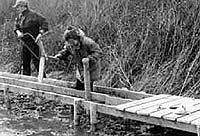|
and Finally |
||
|
Access to the countryside The physically challenged perspective I really wish I had more experience of this, but since I've been in a wheelchair - for four years now - my mobility has been a little restricted. What I mean is my wife and I don't have our own transport to get us about. When I was more ambulant, I volunteered to do some species identification work on a nature trail on the site of the China Clay Museum in Carthew, near St Austell. My taxi fares were paid by the Volunteer Bureau. This involved me going round the nature trail, which wound through about 26 acres of china clay country. I had difficulties with my balance but a walking stick made this easier though I still had trouble and had to take it much easier in the rougher, more uneven parts of the trail; particularly on the steps, but at least they all had wooden rails. I was fascinated to walk through the different habitats with their distinctive plant and animal communities and to see how nature was slowly reclaiming the spoil with little help from man. The job, which I did for two or three days a week for over a year, involved gently sweeping and beating to obtain invertebrates (bugs, which I always tried not to harm when identifying them - afterwards, of course, letting them go, if possible, where they were found). I always think it a pity that traditional biological knowledge can only advance by dissecting dead (often not of natural causes) specimens. Anyway I enjoyed trekking through this semi- natural scenery immensely.
Now I often go with an enabler - someone to help me whenever I need it - and earlier this year I enjoyed doing some wildlife gardening at Allet, with Janis my enabler, and hiking (for me it was a hike!) along the nature trail there. Michael Bradford Guarding the peregrine in Germany Volunteers needed The peregrine is still one of the most endangered species of falcon in the world. In the middle of the sixties there was just a handful of surviving peregrines remaining in Germany. The most important reason for their decline was poisoning of the food pyramid with the pesticide DDT and theft from nests by illegal traders and falconers. It seemed that a lot of these "stolen" young peregrines and eggs were brought to the Middle East. Since that time German environmentalists have been guarding the nests of peregrines in Germany wherever they know of them - with fantastic success! Today, they think, the population of the peregrine in Germany may be some hundreds of breeding pairs, and the peregrine is coming back to the north and the west. In particular, the Aktion Wanderfalken- und Uhuschutz (in English, Peregrine and Eagle Owl Action) has been active in this field. Every year volunteers from all over Germany guard the peregrine's nests, mostly in the south and the south- west of Germany. Their guard posts are situated in caravans, tents and, very occasionally, nearby houses. Guarding the peregrines means spending long, long days with short nights. Everything happening in the nest and its surroundings has to be noticed and written down in a booklet. But it is always both wonderful and spectacular to see the majestic peregrine flying, catching an oriole and feeding the young falcons - everything that belongs to their life. And you can also feel, hear and smell the spring surrounding you during this week in the forest. Strong binoculars give the guards a good view of the nest and its immediate surroundings - it's real life with nature. For twenty years volunteers from NABU Lower Saxony, the twinned partner of the Cornwall Wildlife Trust, have taken part in this action to save the peregrines. And they have great fun! What about you? Can we invite you to join this action too? Enthusiasts are always welcome to guard the peregrines in Germany! If you are interested in doing this wonderful job as a volunteer, if you are keen on birds and nature, and if you would like to live eye to eye with the peregrines for one or two weeks, please contact Trust HQ for details. Rudiger Wohlers |
